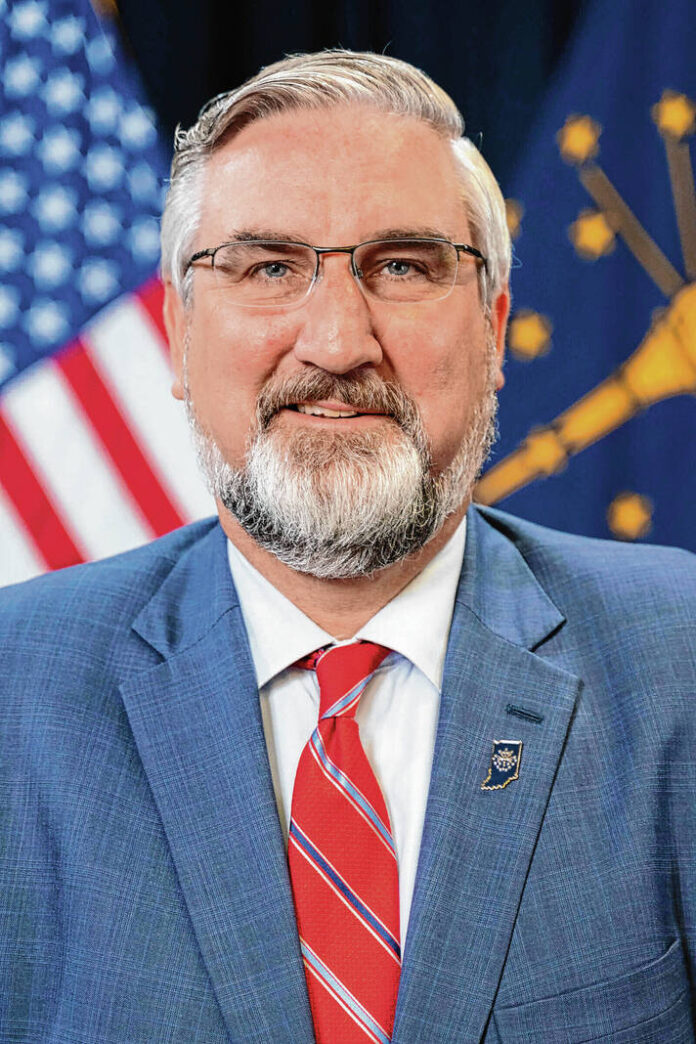Indiana Gov. Eric Holcomb’s latest international trip to promote the state’s energy transition and supply chain efforts has been a success, he said Friday.
Holcomb is at the United Nations Climate Change Conference of the Parties, or COP27, in Sharm El Sheikh, Egypt on an economic development trip. This is the first time an Indiana governor has participated in a UN COP event, and this Holcomb’s 14th international trip.
During the conference, Holcomb delivered a keynote address about Indiana’s efforts to usher in clean energy infrastructure and innovation to the state’s mixture of energy sources. He was also working to advance clean energy- and technology-focused discussions with businesses, universities, U.S. and foreign governments and organizations.
In a call with reporters on Friday, Holcomb said his time in Egypt had surpassed his expectations. He originally accepted the invitation after a past conversation with the British ambassador before the coronavirus pandemic. She had recommended he present all the work the state had done to invest in energy transition efforts at a conference, he said.
There is a lot of investment coming out of the pandemic, and Holcomb was able to share Indiana’s story of building supply chains and eliminating supply chain pain.
“We were able to … share that story with partners who were making decisions along those lines,” Holcomb said. “So that was a success in and of itself.”
Earlier on Friday, Holcomb participated in a presentation with “friends of Indiana,” like General Motors. He was also able to schedule meetings with stakeholders from around the world who have deep interests in Indiana when it comes to growth and the energy transition, he said.
“We’ve been very well received, and I’m happy that I’ve kind of had the field to myself,” he said.
At COP 27, Holcomb also learned about a hydrogen project that was shelved in the United Kingdom, and later took off in the Netherlands. This is a project the state is interested in doing in northwestern Indiana, he said.
He’s also been able to meet with federal officials and other customers to navigate his way though different funding sources for projects, whether it be federal, state or the private sector.
“What I have learned is we often find ourselves trapped in this scenario of ‘It’s either or,’ — You either believe in science or you don’t believe in science; or you believe in the economy or you believe in the environment. It’s both,” Holcomb said.
Holcomb says he’s learned about the urgency of some of these projects and about how creative people are. Different things will work for different communities, and the state has to be mindful of that while trying to be good stewards of the Earth, he said.
Holcomb says his sense of urgency in terms of business and the environment is based on discussions he’s had with companies that are seeking to grow or relocate to Indiana. These decisions have to not only do with things such as workforce and location but also cost, which includes energy.
“You’re talking about specific sources of energy that companies are saying, ‘We want to source from this type,’” Holcomb said.
Indiana is unique because the state has multiple sources of energy and officials are focused on the efficiency of it all, Holcomb said. There also are creative users who are making business decisions about where to grow and others are watching them. These users are wanting to come to where the “smart money” is going, he said.
“That’s the urgency because decisions … are being made right now about the future of mobility, about the future of fuel, about the future of ag bio-science,” he said. “We’re just in the catbird seat when it comes to aligning state government policy, the private sector and academia like very few others.”
Holcomb was also asked about future growth in the state for electric vehicle makers. Right now, officials are chasing battery storage and recycling expertise, along with developing relationships with steel and battery companies. Officials are trying to grow the ecosystem for electric vehicle makers, and are wanting to do it methodically, he said.
Holcomb also discussed solar power, and whether he would consider reintroducing net metering — which was recently phased out — as a way to incentivize homeowners to invest in solar power. Net metering allows customers who generate their own electricity from solar power to sell the electricity they aren’t using back into the power grid.
He declined to say whether net metering would be introduced, though he is sure it is a topic which will will reemerge. Holcomb wants to make sure he’s not “falsely goosing” the market, and that the market is responding to demand. It needs to be both cost-effective for companies and affordable for the consumer. Officials want to make sure they’re not prioritizing one type of energy over the others, he said.
At the end of the call, Holcomb was asked by reporters about his decision to go on so many foreign trips, including Israel and Taiwan. He said he does not go where he isn’t welcome and goes to places where he can work on solving problems.
While he has been in Egypt, several people told Holcomb it was refreshing to see a governor who was taking interest in their area. Bureaucracies around the world are focused on their own responsibilities, and he’s focused on making sure Indiana can grow and offer more opportunities for social upward mobility, Holcomb said.
“I’m going to share the message that Indiana is an oasis of innovation,” Holcomb said. “Where we value (innovation), and we try to encourage that, and we invest in that, and that we can help companies with the problems that they face.”





